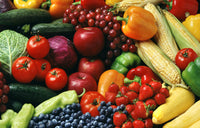Organic foods lower public health hazards for families by reducing their exposure to harmful and persistent chemicals on the farm and in food, as well as the soil in which they work and play, the air they breathe, and the water they drink.
Pesticides are extremely dangerous to children. Thus, introducing organic food and fiber goods onto the market allows parents the choice of selecting items that are free of these poisons.
Not only can organic agriculture assist decrease public health hazards, but accumulating data reveals that organically cultivated foods are rich in nutrients such as Vitamin C, iron, magnesium, and phosphorus, with reduced exposure to nitrates and pesticide residues when compared to conventionally grown items.
While demonstrating the health advantages of a specific meal is a difficult topic to answer, evidence is emerging that there are certain healthier nutritional profiles associated with the use of diverse organic foodstuffs.
For example, a study published in the journal PLOS ONE in December 2013 discovered that organic whole milk contains much greater quantities of heart-healthy omega-3 fatty acids than milk from cows bred on conventionally managed dairy farms.
In the meanwhile, a study published in the journal Food Chemistry discovered that organic soybeans have a better nutritional profile than conventionally cultivated or genetically engineered Roundup Ready soybeans.




